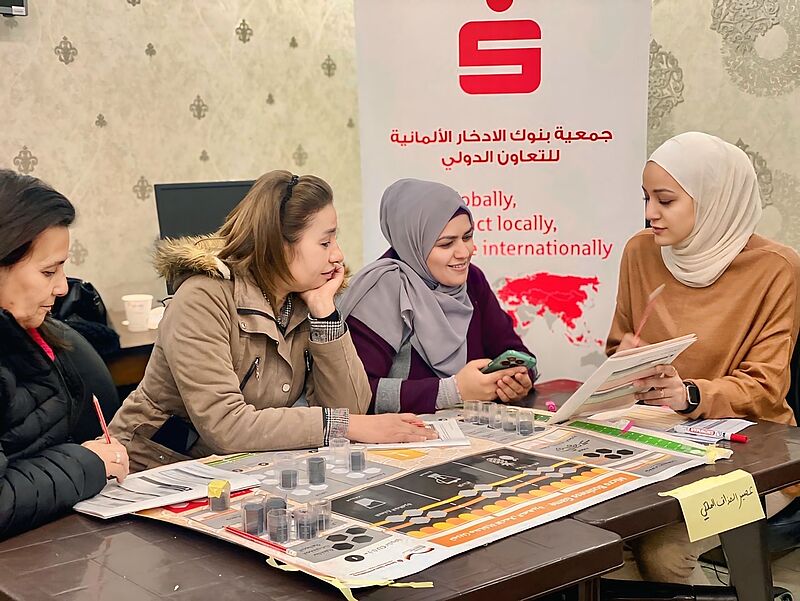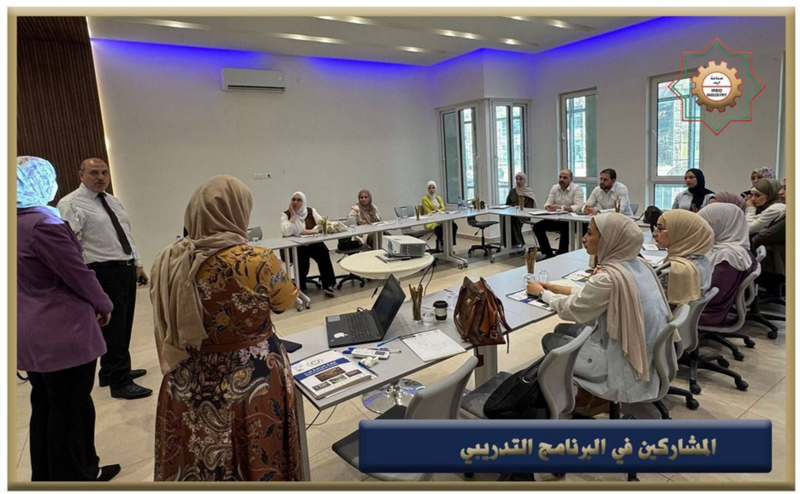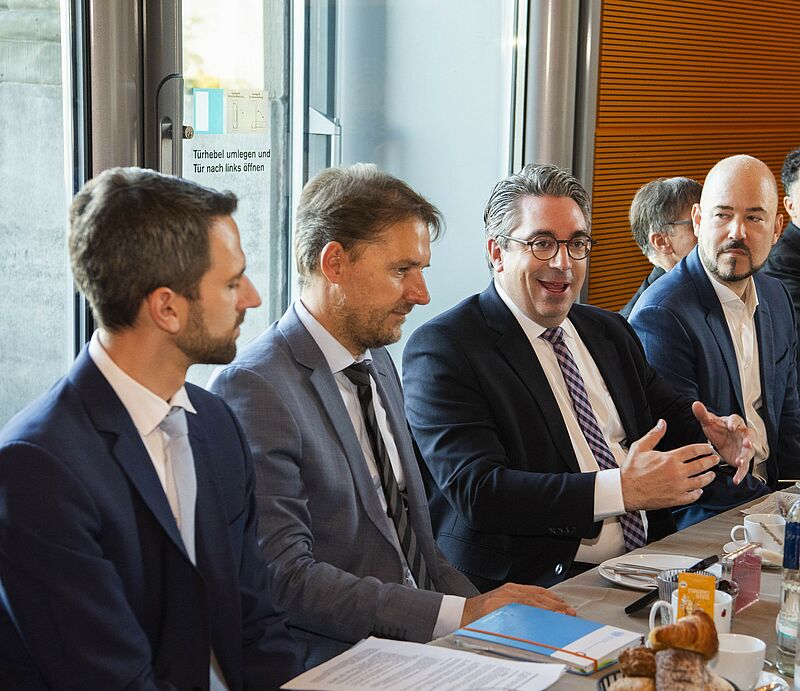Here you can find out more about the latest news from the Partners in Transformation, which we have already briefly presented to you in our newsletter.You want to subscribe to the newsletter? Please register here.
News from the Partners in Transformation (5-2025)

DSIK: International cooperation for stabilisation in the Middle East

International cooperation plays a central role in stabilising regions in crisis. In the Middle East, in particular, it is clear how important economic stability and trust in the financial sector are for peace and social cohesion. The German Sparkassenstiftung for International Cooperation (DSIK) has been active in Jordan for many years and is currently preparing a fact-finding mission with a view to initiating a project in Lebanon to facilitate sustainable stabilisation by strengthening knowledge, institutions and partnerships.
Jordan: Stabilising the financial sector through long-term partnerships
Jordan is considered an important anchor of stability in the region but is facing major challenges, particularly due to the large number of refugees it has taken in from neighbouring countries. DSIK is working locally to promote the integration and economic participation of vulnerable population groups. To this end, it organises numerous activities with strong local partners, including the Central Bank of Jordan, the organisation Microfund for Women and the Jordan Forum for Business and Professional Women.
Activities in Jordan are primarily focused on strengthening the financial sector through advice and targeted training. At the same time, DSIK supports small entrepreneurs in setting up and growing their businesses. It also provides financial and economic education that benefits broad sections of the population. A particular focus is cooperation with the German partner, Sparkasse Offenburg/Ortenau. The exchange of expertise with the Sparkassen-Finanzgruppe not only benefits people in Jordan who receive practical support, but also provides the German Sparkasse with valuable international experience. This creates advantages for Germany too, for example, by strengthening expertise in international project management and positioning the German Sparkassen system as a reliable partner worldwide.
Lebanon: Understanding the financial crisis – creating prospects
Lebanon has been in a deep financial and economic crisis for some years. The financial crash of 2019 and the collapse of a dysfunctional banking system have permanently destroyed confidence in the financial sector. Customer deposits have been frozen, exchange rates are unstable and corruption and political conflicts are exacerbating the situation. In order to better understand the situation on the ground, DSIK is planning a fact-finding mission to Lebanon with a view to initiating a project. The aim is to work with relevant stakeholders to examine how new prospects can be created for the population by strengthening the financial sector, enhancing transparency and promoting economic stabilisation.
Economic stability as the basis for peace
Whether in Jordan or Lebanon, stabilisation of the financial sector and economic participation opportunities for all sections of the population are decisive factors for social peace. By strengthening structures in the long term and opening up new prospects, DSIK has a positive impact not only in the region, but also in Germany.
sequa: Partnerships with the private sector strengthen resilience

BMZ’s new role on the National Security Council highlights the fact that security is also about economic stability, jobs and social dialogue. Partnerships with the private sector can make an important contribution here.
Rethinking security: the role of BMZ on the National Security Council
With the establishment of the National Security Council, the German Government has reorganised its security policy architecture. This is a clear signal of a broader understanding of security: security does not come about through military strength alone, but also through stable institutions, jobs and social participation. This is precisely where the partnership programmes implemented by sequa – Business Membership Organisation Partnerships (KVP), Vocational Education and Training Partnerships (BBP) and Trade Union Partnerships (GP) – come into play. Under BMZ’s umbrella brand Partners in Transformation, these programmes strengthen chambers, associations, educational institutions and employee representations. They have an impact in places where instability and migration pressures are brought about by a lack of prospects and weak institutions: they create productive, formal and secure jobs – and thus genuine resilience.
Practical examples from Jordan, Nigeria and Albania
Current examples of projects under the KVP and BBP programmes illustrate what this means in practical terms:
- Jordan: The Cologne Chamber of Skilled Crafts is supporting the chambers of industry in Amman, Irbid and Zarqa in setting up their own vocational education and training departments. These departments will work closely with companies to offer training courses that open up new prospects for young people.
- Nigeria: The Giessen-Friedberg Chamber of Industry and Commerce is strengthening the Nigerian Association of Chambers of Commerce, Industry, Mines and Agriculture and selected member chambers. This enables the chambers to professionalise their range of services – from financial training for women entrepreneurs to new one-stop shops designed to help SMEs grow and formalise their operations.
- Albania and Kosovo: Cooperation between the Dortmund Chamber of Skilled Crafts, the Shën Jozefi Punëtor vocational school and the Tirana Chamber of Industry and Commerce has resulted in 106 companies providing internships and climate-friendly technologies being mainstreamed in the curriculum. At the same time, the Koblenz Chamber of Skilled Crafts is cooperating with the National Chamber of Skilled Crafts of Albania and the Association for Skilled Crafts and Entrepreneurs of Prizren (Oda Prizrenit) in Kosovo. The first examinations for master craftspersons in hairdressing have already been piloted in line with German standards, while a national PR campaign is boosting the trade’s image and the Kosovan partner has submitted nine proposals for reform of the Law on Crafts – tangible steps towards improving the framework for businesses and employees.
Social dialogue as a factor for stability
The Trade Union Partnerships are also providing a major boost: cooperation between the German Education Union (GEW) and the Trade Union of Education and Science Workers of Ukraine (TUESWU) is helping to strengthen the trade union in organisational terms, train multipliers and expand services for members. This will ensure social dialogue, improve working conditions and increase the attractiveness of the teaching profession – a key prerequisite for stability in the reconstruction process.
In summary: economic development creates security
BMZ’s inclusion in the National Security Council demonstrates that security policy cannot be considered solely in military terms, but also requires economic and social stability. KVP, BBP and GP projects are specific instruments for establishing this connection, because they link the economy with development, reduce instability and contribute to peace and resilience.
IPD: Exchange with politics: Thinking foreign trade and development together

The interplay between foreign trade and development cooperation was the topic of the Parliamentary Breakfast organised by the Federation of German Wholesale, Foreign Trade and Services (BGA) together with the United Nations Industrial Development Organisation (UNIDO) during the first week of the German parliamentary session after the summer break. Using the example of the Import Promotion Desk (IPD) and reports from German companies, the importance of the IPD as an import promotion initiative for the German economy became clear. The participants agreed that in view of the geopolitical challenges and the need to diversify procurement management, the IPD is an important instrument for promoting foreign trade.
Dovetailing foreign trade promotion and development cooperation
Following the thematic introduction by Stefan Rouenhoff, Parliamentary State Secretary at the Federal Ministry for Economic Affairs and Energy (BMWE) and patron of the event, and Marcus Schwenke, Head of the Foreign Trade Policy & Development Cooperation Department at the BGA, the focus was on the work of the IPD.
Dr Andreas Gemählich from IPD and Benjamin Knödler, Head of Division for Business Networks at the Federal Ministry for Economic Cooperation and Development (BMZ), presented the Partners in Transformation programme IPD, which works at the interface between foreign trade and development. They highlighted the benefits for both trading partners - for producers in developing and newly industrialising countries as well as for European importers. The aim of the IPD's work is to achieve a win-win situation in which both sides benefit from the advantages of trade. This is possible because the partnerships are based on a common understanding of quality and other important requirements such as logistics, reliability and sustainability.
Picture (from left): Dr. Andreas Gemählich, IPD, Dr. Olaf Deutschbein, UNIDO, Stefan Rouenhoff, Parliamentary State Sectretary at the Federal Ministry for Economic Affairs and Energy (BMWE) , Marcus Schwenke, BGA.
develoPPP: Strengthening the digital economy and market positions through IT security
A shortage of investment in cyber security and training is leading to security gaps and putting the competitiveness of many companies at risk – and not just in the East Africa region. Together with Deutsche Investitions- und Entwicklungsgesellschaft mbH (DEG), SEC Consult Deutschland Unternehmensberatung GmbH is training local IT staff to improve the quality of cyber resilience and strengthen the local digital economy as a whole. A virtual knowledge platform connects stakeholders and is enabling the project’s success to reach a wider audience and promote greater awareness and resilience among other businesses.
Published on

